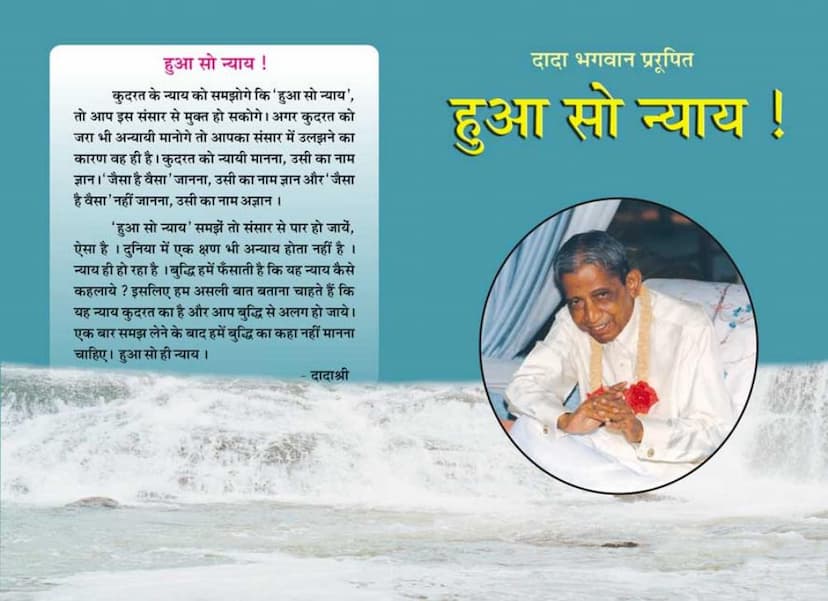Hua So Nyaya
Added to library: September 1, 2025

Summary
Here is a comprehensive summary of the Jain text "Hua So Nyaya" by Dada Bhagwan, based on the provided pages:
Book Title: Hua So Nyaya (Whatever Happened is Justice) Author: Dada Bhagwan Publisher: Dada Bhagwan Foundation
Core Message:
The central and overarching message of "Hua So Nyaya" is that "Whatever has happened is justice." Dada Bhagwan teaches that understanding and accepting this principle as the absolute truth of nature is the key to achieving liberation from the cycle of birth and death (samsara). Believing that nature is unjust in any way is identified as the root cause of our entanglement in worldly suffering.
Key Concepts and Teachings:
- Nature's Inherent Justice: The book emphasizes that the universe operates under a perfect, infallible system of justice. There is no such thing as injustice in nature, not even for a moment. All occurrences are precisely as they should be, in accordance with natural laws.
- The Role of Intellect (Buddhi): Our intellect often struggles to comprehend how seemingly unfair events can be considered just. It gets caught in trying to find fault and label things as unjust. Dada Bhagwan advises to detach from the intellect's interpretations and surrender to the truth of "Hua So Nyaya."
- Knowledge (Gyan) vs. Ignorance (Agyan):
- Gyan: Knowing things as they truly are. This includes understanding that "Whatever happened is justice."
- Agyan: Not knowing things as they truly are. This is the root of our suffering.
- "Akram Marg" (The Stepless Path): The text introduces Dada Bhagwan's unique spiritual path, the "Akram Marg," which is described as a shortcut or elevator path to self-realization, as opposed to the gradual, step-by-step approach.
- Dada Bhagwan as a Medium: Dada Bhagwan explains that the visible form, "A. M. Patel," is not Dada Bhagwan himself. Dada Bhagwan is the inner, manifested divine presence, present within all beings. He himself bows to the Dada Bhagwan within.
- The Nature of Karma: Events that befall us are not random but are the result of our past actions (karma). The principle of "Hua So Nyaya" means accepting these karmic consequences as just.
- "One cannot be pricked by a mosquito without a prior account." This illustrates the precise accounting of karma.
- "An incident has so many causes, and an accident has too many causes." This explains how complex karmic accounts manifest.
- Understanding Suffering: When we perceive injustice, it's because our intellect is trying to find fault, leading to greater suffering. Accepting "Hua So Nyaya" brings peace, even amidst adversity.
- The World is Fundamentally Just: The book reiterates that seeking justice in the world is futile because the world itself is inherently just. All disputes and conflicts arise from this mistaken search for external justice.
- Distinguishing Divine Justice from Human Justice:
- Human Justice (Adalati Nyay): This is often flawed, influenced by ego, and can lead to more problems. It is subject to human interpretation and error.
- Divine/Natural Justice (Kudrati Nyay): This is absolute, unerring, and based on karmic accounts. It's not about punishment but about the settling of accounts.
- Acceptance and Non-Interference: The advice is to accept what happens without complaint or resistance. This non-interference is crucial. If one creates an entanglement through unjust means, it will be resolved through unjust means. If created through just means, it will be resolved justly.
- The Necessity of "Apparent" Unjust Elements: Even seemingly negative elements like thieves, snakes, or natural disasters are part of nature's grand design and serve a purpose in the karmic balance. They are "nimitt" (instruments) fulfilling their karmic roles.
- The Cause of Suffering is Self-Projection: Our own unresolved karmas and tendencies (tendencies of the ego) are the root cause of our suffering. Blaming others or external circumstances is a misdirection. We are fully responsible for our projections.
- Practical Application:
- When wronged, accept it as justice. Don't complain or seek redress through external means, as this only fuels the ego and prolongs suffering.
- If you need to recover something (e.g., money owed), do so with humility and without creating conflict. Frame it as a need, not a demand, and accept whatever outcome occurs as justice.
- When facing difficulties, practice non-interference and observe what is happening. The key is to avoid looking for justice.
- The ultimate aim is to become "nirvikalp" (undivided, without doubt or alternative thoughts) by accepting "whatever happened is justice."
- The Meaning of "Ugahī" (Recovery/Collection): The term "ugahi" (collection of dues) is used in the context of recovering what is owed. The book suggests that the worldly entrapment often comes from the pursuit of "ugahi," rather than from the rule of any queen or authority. This pursuit often leads to conflict and suffering.
- True Liberation: Liberation comes not from finding external justice, but from accepting the internal truth that "Whatever happened is justice." This acceptance leads to the dissolution of the ego and the end of suffering.
Publisher and Context:
The book is published by the Dada Bhagwan Foundation, indicating it is a work of Dada Bhagwan's spiritual teachings. The presence of multiple publications from the foundation listed on page 3 suggests a prolific output of spiritual literature focused on self-realization and the principles of Gnani Purush Dada Bhagwan.
In essence, "Hua So Nyaya" is a profound guide to understanding the divine, logical order of the universe. By embracing the principle that all events are just, individuals can transcend their ego-driven perceptions, release themselves from suffering, and move towards spiritual liberation.